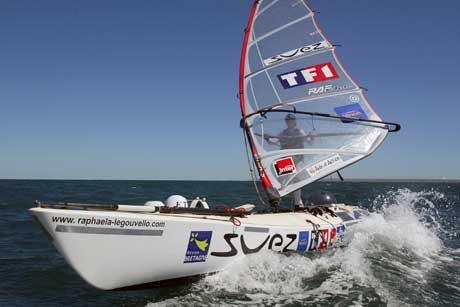Monday 19th June 2006
Many thanks to all the web surfers
for their kind messages of encouragement
or congratulations concerning our website.
Hello everybody,
Just back in Brittany I would like to express my thanks to one and all for your messages of support and congratulations both during the crossing and after this terrific arrival in Port in the Reunion island.
Rest assured that I value all those signs of friendship more than anything else. It was impossible for me to answer during the crossing. But every time my team told me about it or read your messages to me I felt moved and marvelled at that chain of good vibes and energy that bonded my isolated board in the middle of a tumultuous ocean to the land.
The adventure is now over. There will still be a film, conferences, meetings, debates and exchanges…
Within a few weeks it will also be a pleasure for me to answer one and all.
I must now think of the future. But this whole lot of energy exchanged makes me happy and confident.
Once again many thanks and a fair wind and sea to you all. May all your projects be successful.
Raphaëla le Gouvello
Sports Project Management - Press relations: HICKORY Agency
32, rue du Faubourg Poissonnière - 75 010 Paris
Tél. : 01 56 03 69 00 - Fax : 01 56 03 69 30
Anne Combier - Associate Director- annec@hickory.fr
Alexandre Durand - Head of Project- adurand@hickory.fr
TF1 : Guillaume Jouteux – 01 41 41 29
59 – gjouteux@tf1.fr
TV Breizh : Alexandra Hamon– 02 97 35 01 39–
ahamon@tv-breizh.com
SUEZ : Caroline Lambrinidis - 01 40 06 66 54
caroline.lambrinidis@suez.com
FRANCE INTER : Aliette Maillard – 01 56 40
37 94
aliette.maillard@radiofrance.com
AIDE ET ACTION : Anne Cassiot - 01 55 25 70 13
anne.cassiot@aide-et-action.org

